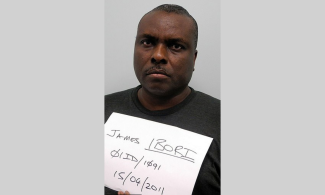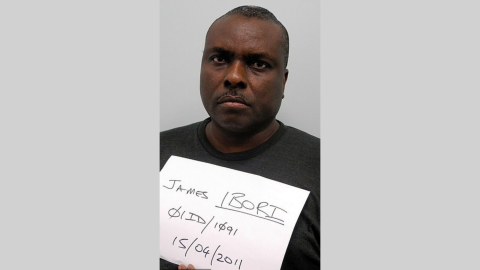
In 2012, a UK court sentenced Ibori, who governed Delta from 1999 to 2007, to prison after convicting him of fraud and money laundering.
The Alliance on Surviving COVID-19 and Beyond (ASCAB), a coalition led by Femi Falana (SAN), has said the Nigerian government frustrated the trial of former governor of Delta, James Ibori, in the United Kingdom (UK) but now wants to receive the recovered loot.
In 2012, a UK court sentenced Ibori, who governed Delta from 1999 to 2007, to prison after convicting him of fraud and money laundering.

He had pleaded guilty to 10 counts bordering on fraud involving sums amounting to about $66 million.
He was slammed a 13-year jail term but returned to Nigeria in February 2017 after serving part of his term.
Ibori later filed an appeal against his conviction which was dismissed by a UK court, paving the way for confiscation of his assets in the UK.
On Tuesday, the UK government made a commitment to return £4.2 million loot recovered from the former governor to the Nigerian government.
Abubakar Malami, Attorney-General of the federation, had said the recovered loot would be channelled into federal projects.
This led to a controversy over whether the loot should be returned to the Nigerian government or the government of Delta state.
In a statement issued on Sunday, Falana said the Nigerian government was not supportive of the prosecution of Ibori in the UK.
The statement read, “In opposing my position on the legitimate right of the people of Delta State to the sun of £4.2 million confiscated and recovered from the Ibori loot some colleagues have argued that the fund should be forfeited to the Federal Government on the grounds that the (Emmanuel) Uduagban regime (the administration that succeeded Ibori's) had said that no money was missing from the coffers of the state government.
“No doubt, the former Delta State Government had denied any loss of money during the proceedings of the Federal High Court for the confiscation of the $15 million bribe given to Mr. Nuhu Ribadu by Chief James Ibori. Hence, the presiding judge, Kolawole J. (now JCA) directed that the fund be paid into the Federation Account for distribution in line with the provisions of the Revenue Allocation Act.
“But the Delta State Government never said that the over £100 million confiscated from Chief Ibori in the London trial did not belong to the people of Delta State. However, it is on record that the Federal Government openly opposed the trial of Chief Ibori in the United Kingdom. In fact, in utter breach of the provisions of the Mutual Legal Assistance Treaty between Nigeria and the United Kingdom the then Attorney-General of the Federation, Chief Michael Aondoakaa SAN rejected the request to make relevant documents available for the trial in the United Kingdom on the ground of sovereignty.
“In particular, Chief (Michael) Aondoakaa refused to entertain the request of the UK Metropolitan Police and made under bilateral mutual assistance to Nigeria on the ground that the request was not made by the Home Office. The request was to question Chief Ibori about his involvement in corruption and money laundering that occurred in the United Kingdom.
“Aondoakaa said: 'I think Nigeria, as a sovereign nation, deserves some respect. They [the Metropolitan Police] knew they were wrong, otherwise why did they now write through the Home Office requesting mutual assistance to quiz a prominent Nigerian. ... I cannot compromise the sovereignty of this country, if they make incompetent requests I will turn them down 20 times. Any request from Metropolitan Police would be refused by this office, period.' [See Kolawole Olaniyan, Corruption and Human Rights Law in Africa, Oxford: Hart, 2014, p 15].
"'Dr. Olaniyan criticised the use of 'Sovereignty, technicalities, and small details' as justifications for refusing requests for mutual cooperation and assistance in cases of corruption involving high-ranking state officials.
“Similarly, African representatives who participated in the negotiation of the UNCAC insisted that any reference to protection of sovereignty should not be interpreted in a way that would undermine the efforts of countries seeking to recover illicit assets. Article 51 of UNCAC on asset-recovery explicitly states that the return of stolen assets is 'a fundamental principle of the Convention'. The effectiveness of the asset recovery provisions of UNCAC depends to a large extent on the measures for mutual legal assistance. Thus, states are required to establish a legal framework to enable them to provide assistance to other states in the recovery of assets acquired through corrupt practices recognised under the convention. To ensure effective international cooperation in the fight against corruption and money laundering, the UNCAC in article 60 requires states 'to consider' various potential methods to provide technical assistance to each other in their plans and programs to prevent and combat corruption.
“As far as international law is concerned the recovered fund belongs to the people of Delta State who are the victims of the corrupt practice of Chief Ibori. Having ratified the United Nations Convention Against Corruption (UNCAC) both Nigeria and the United Kingdom are bound by Article 35 thereof which states that: 'Each State Party shall take such measures as may be necessary, in accordance with principles of its domestic law, to ensure that entities or persons who have suffered damage as a result of an act of corruption have the right to initiate legal proceedings against those responsible for that damage in order to obtain compensation.'
“The British Government is releasing the stolen money to Nigeria in strict compliance with international law and not out sheer generosity as erroneously argued by some lawyers. According to the travaux préparatoires to the UNCAC,' 'this article is intended to establish the principle that States Parties should ensure that they have mechanisms permitting persons or entities suffering damage to initiate legal proceedings, in appropriate circumstances, against those who commit acts of corruption.'"
He continued, “From the foregoing, it is undoubtedly clear that the huge success recorded in the prosecution of the case was anchored on the collaboration between the Economic and Financial Crimes Commission (EFCC) and the Metropolitan Police. To that extent, the Federal Government which had set out to frustrate the trial of Chief Ibori cannot turn round to lay claim to the fund confiscated on the orders of the British courts. Having regards to the facts and circumstances of the case the the Ibori loot belongs to the people of Delta State in toto under domestic and international law. After all, the Federal Government had handed over the fund stolen by two former governors, in similar circumstances, to the people of Bayelsa and Plateau States.
“It is common knowledge that Nigeria through the EFCC has consistently returned huge sums of money recovered from local criminal elements convicted by Nigerian courts for swindling foreigners including European and Americans. Sometime in November 2005, the EFCC returned US $17 million to a Brazilian bank – the first instalment of $242 million siphoned by a group of Nigerian scammers to William Richey, a lawyer representing the defunct Banco Noroeste of Sao Paolo, Brazil. On that occasion, Mr. Nuhu Ribadu said that 'by making this restitution to the victim of the scam we also want to send a strong, unequivocal message that we will no longer harbour such fraudulently acquired funds no matter where the victim is.'
“The return of the huge fund was based on the orders of forfeiture made by Olubunmi Oyewole J. (now JCA). But out of sheer colonial mentality, some lawyers are asking the Nigerian people to clap for the British Government for returning £4.2 million out of Ibori loot of over £100 million warehoused illegally in the United Kingdom in defiance of the money laundering laws of that country. It is interesting to note that many Nigerian lawyers are not aware that banks and other financial institutions in the United Kingdom have recently been ordered to pay hundreds of millions of dollars as damages for aiding and abetting corrupt public officials and drug barons who live in foreign countries.
“Finally, no doubt, the former Delta State Government was irresponsible to have denied that Chief Ibori looted the treasury of the State at the material time. But such denial cannot be a justification for the confiscation of the Ibori loot of over £100 million that is expected to be repatriated to Nigeria by the British Government. After all, before his assumption of office as President in May 2015, General Mohammadu Buhari had repeatedly maintained that the late General Sani Abacha did not steal a dime from the account of the Federal Government. But the Federal Government under the President's watch has continued to recover the remaining Abacha loot and no one has suggested that such recovered loot be paid to the account of the United Nations or African Union on moral grounds.”